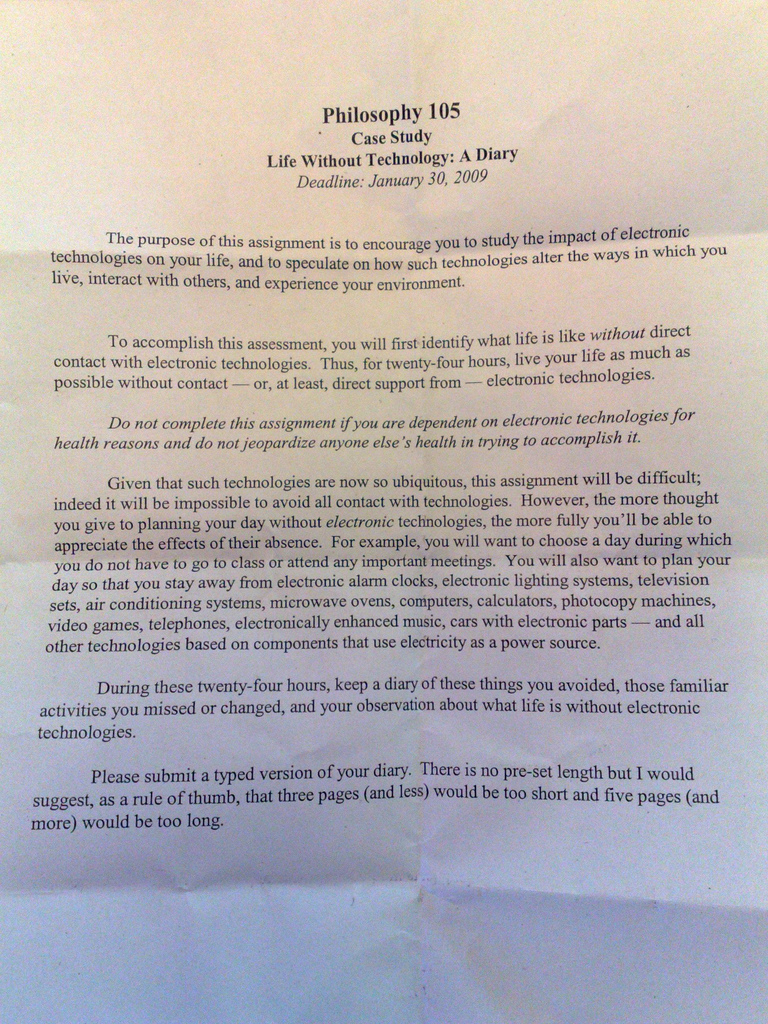The first formal assignment for the Philosophy 105: Technology, Values & Science course I’m participating in this winter is a “case study” that requires abstaining from digital technology for 24 hours. While I’m not technically, as an unofficial interloper, required to carry this out, it wouldn’t feel right to sup from the digital table while everyone else was voluntarily starving, so I’m in.
Thus, as of of 4:00 p.m. Atlantic Time today, January 24, 2009, I’ll be offline.
What offline means is, of course, an arbitrary thing, and the case study guidelines make it clear that figuring out where to draw the line is part of the activity. Do I need to shut off the furnace at home, for example, because it uses digital thermostats? If I was a purist, yes. But I won’t (it’s going down to -20 degrees C tonight!). However I’ll unplug the TV, the clock radio, the computer and the phone. I’ll shut off my mobile phone, leave the car parked, and try to convince Oliver to leave his Nintendo DS turned off (after an initial bout of enthusiasm that involved running around shutting off all the lights, Oliver has turned negative on the whole idea; I’ve got 4 hours to bring him back around).
My jury is still out on the espresso maker — it seems pretty manual, but I’ve a suspicion there’s a chip in their somewhere. And while our oven is clearly out — it has digital-only controls — I’m considering ignoring the fact that the range, which has seemingly analog controls, may also have digital wizardry buried inside.
My original thought was to sequester us away for 24 hours in a primitive cabin but that seemed to ignore the spirit of the case study — it’s easy to shut off when you’re outside of your home environment, a lot harder to confront your dependence on the digital when you’re faced with its stark absence. So we’ll try to maintain some semblance of a normal life and see what it is we miss.
See you on the other side.

 I am
I am
Comments
Is “digital” really the issue
Is “digital” really the issue? Why should someone with a 1965 stereo be allowed to have music but someone with a 1995 system not be allowed? What’s to be learned? Maybe only what the word “digital” means. I would not want to designate an old radio “digital” because it is a “transistor radio.” A lot of what technology does with transistors is what it used to with vacuum tubes. I suppose that includes vacuum tube computers, at least some of which must have been “digital” in some modern sense. But that just reinforces my belief that whether an engineer chooses a tube or a transistor doesn’t decide whether a technology is digital. Neither should a “chip” in some sense, since a chip is just a very small integrated circuit, and these predate what we call the digital age. The first of those 900MHz cordless phones were “analog” and like you I suppose they have chips or at least an integrated circuit in them. Incidentally, though, even if you had one of those in your house, or an even older cordy phone, I imagine your signal gets converted to digital at the curb or not a lot farther away. (Might be interesting to know if you could call your immediate neighbors analog and thereby be within the rules, but not across the street. Walky-talkies could be kosher, if you have friends in army surplus.
Hats off to you … You’re a
Hats off to you … You’re a brave man Peter!
Hope the withdrawls aren’t to bad …
You should have taken English
You should have taken English 331 instead, we are reading The Lost Salt Gift of Blood, good Maritime Literature. Are any of your classmates taking Computer Science courses; will they neglect their CS work by being undigital? Is writing PHP code with pen and paper digital? What about doing Boolean algebra in your mind?
I had to write Turbo Pascal
I had to write Turbo Pascal with a pencil during an exam when I was taking Computer Science at UPEI. I imagine it would be a lot harder to parse that carbon code than it was to write.
@oliver Of course you’re
@oliver Of course you’re right, “digital” is a completely arbitrary dividing line.
Glad to see you back! When
Glad to see you back! When you didn’t post yesterday @ 4, I was afraid the experiment had killed you.
The pleasant after-effects of
The pleasant after-effects of technology detox lasted into the evening. We survived, suffice to say. Full report to follow.
Does this mean you’re going
Does this mean you’re going to be an advocate for Zap Your PRAM 7.0 to be in in tents and by campfires?
- in
- in
@Peter. Doh! I see now
@Peter. Doh! I see now “digital” wasn’t the official key word, but maybe just your one-time casual paraphrase of “electronic.” “Electronic” does imply transistors to me, seems to draw a fairly clear line and does seem to “focus the mind” on what’s “infiltrated” our tools, appliances, infrastructure etc.
Add new comment